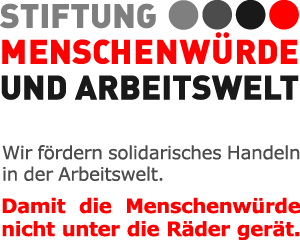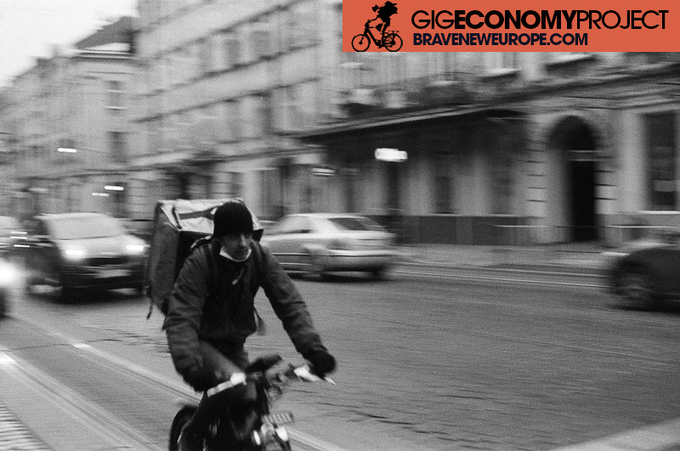Lis Gaibar examines a new study on the health risks of being a rider, and whether the planned ‘Rider Law’ of the Spanish Government will improve the situation.
This piece was originally published in Spanish on El Salto. Re-published and translated here with permission of the author.
This series of articles concerning the Gig Economy in the EU was made possible thanks to the generous support of the Foundation Menschenwürde und Arbeitswelt


A study by the University of Valencia draws the profile of delivery drivers working in the city: mostly men, young and without sufficient protection measures, especially if they are falsely self-employed. Whether the Rider’s Law will serve to correct the risks and precariousness of work is still an unknown quantity, and the Riders for Rights courier group is not at all optimistic about it.
Recent statements by Sacha Michaud, co-founder of Glovo, the Spanish food delivery platform, in which he defended the benefits of the “flexibility” of these platforms and defined “having two or three jobs at the same time” as “a reality” aroused the indignation of the delivery drivers: neither the successive legal victories in favour of the riders and against the digital platforms, nor the repeatedly denounced precariousness of those who have this means of income, nor the record of accidents and even deaths among delivery drivers seems to dent, they regret, the discourse of the employers.
This last point, that of occupational hazards, has recently been investigated by the Chair of Collaborative Economy and Digital Transformation at the University of Valencia. The study, led by Adrián Todolí, professor in Labour Law, is based on a previous collaborative work between the Valencian Institute of Occupational Safety and Health (INVASSAT) and the Basque Institute of Occupational Safety and Health (Osalan), which concluded which were the main risks for the safety and health of platform workers: More stress – resulting in muscle pain, repetitive strain injuries, vision problems, headaches, addictions, depression or burnout, among others – due to the pressure to work fast because of the monitoring and control of the activity; difficulty in establishing limits between work and rest due to the forced hyperconnectivity of these people; complication in direct communication due to the virtualisation of these tools – with consequences for both physical safety and mental health – and accidents while driving, among others.
Whether the riders’ employment relationship with the company – i.e. whether they are bogus self-employed or salaried workers – influences the incidence of these risks was one of the questions they wanted to resolve. The answer, according to the first results, is yes.
Precarious and less protected
According to data from the 2018 Road Accident Observatory, accidents involving riders account for 27% of all accidents involving two-wheeled vehicles (bikes, motorbikes and scooters) in Spain.
“I had a pretty serious accident, they had to take me to hospital by ambulance and I was on sick leave for a month”, says Forés, a member of Riders for Rights, a group that denounces the precariousness of delivery drivers with a presence in several cities. “There are quite a few accidents in Valencia, the other day they had to move another rider who was on a motorbike, we only hear about the ones that appear in the press, but there are many more,” says the delivery driver. Some with dramatic consequences: “Safety measures are rarely used, it’s normal that there are accidents and that these accidents are more serious”.
Only 18% of the delivery drivers who work in Valencia with bicycles wear helmets, according to the university research, which also concludes that workers with an employment relationship with their company tend to use personal protective equipment to a greater extent. Todolí explains that this happens for two reasons: “If there is a contractual relationship, the company is obliged and responsible for providing safety measures for the delivery person. It is easier for a worker with a permanent contract to ask for a helmet, bicycle lights, etc.; whereas if he is self-employed or formally self-employed, the reality is that the company will not provide him with any safety measures because it will claim that as he is self-employed it is not responsible for providing this material or ensuring that it is used”.
Why are there so many accidents among delivery drivers? These things happen both because of haste and because the riders work for the platforms, but the platforms have never given them an Occupational Risk Prevention”, says Forés. “When Telepizza hires you, you have to pass a PRL, but not for Deliveroo, Glovo and Uber. It’s implausible,” adds the delivery driver. Todolí adds that, in the event of a sanction by the labour inspectorate or even the local police – for example, not wearing a helmet – with the figure of false self-employed or TRADE, the fine goes into the same pocket: “If there was an employment contract, the company would pay for it”, Todolí stresses.
Among the results of the research, he highlights that six out of ten workers work for Glovo’s algorithm, approximately 25% work for Uber, 10% for Deliveroo and 5% for Just Eat, which means that “more than 94% would be formally self-employed or [a registered trader], living with insecurity in their income, and having limited labour rights”.
This lack of protection was evident at the beginning of the pandemic, when the riders had to organise themselves to provide personal protective equipment – València City Council provided masks to Riders for Rights València – to a sector that was considered essential and that did not cease its activity even in the toughest moments of confinement, but that in the first moment were not protected by the platforms.
Rider Law: a solution?
The idea of the research led by Adrián Todolí is to carry out a second phase in May to check whether the Rider Law has increased the level of security among delivery drivers: “Our hypothesis is that it has. If the delivery drivers are employed, we believe that the levels of use of protection would be much higher”. They hope that the Rider Law will be approved by spring, but it has been pending since August last year: according to the latest information, the government is pushing to reach an agreement and thus begin to process the changes in February, but for the moment neither the employers, nor the unions, nor the companies like it.
Neither does Riders for Rights València. Pepe Forés, spokesman for the group, says that the regional collective has had access to the text and “strongly rejects” what would be the norm for now: “It is a pantomime, it changes nothing. What we want is that the Workers’ Statute is complied with, that what the judges have said is complied with, and the Rider Law is useless, the only thing it does is pass the buck to the judges and allow Podemos to wear a badge”, defends the delivery driver. “For the moment we are continuing as usual, there is no substantial change. It’s not even close to what they promised, and although in theory the law is a start, it seems to me that they are going very slowly”, says Forés.
Rodant, the Valencian alternative
The existence of alternatives such as Mensakas in Barcelona or La Pájara Ciclomensajería in Madrid have recently been joined by Rodant Bicimissatgeria, which at the beginning of January achieved its funding objective through crowdfunding. Born from a “group of riders tired of the precariousness of these platforms”, Forés explained to this newspaper that the members of the cooperative would be “truly self-employed” and that they would have more decent salaries. As far as protection measures are concerned, the delivery driver assures us that they already have protection material and that, among other measures, they are not accepting cash payments until the pandemic has passed.
Rodant Cooperativa also stresses that the differential issue of companionship and not being subject to an algorithm also affects the issue of occupational risks: “We want to show that you can order food at home in a much more responsible way”, concludes the spokesperson.


Be the first to comment